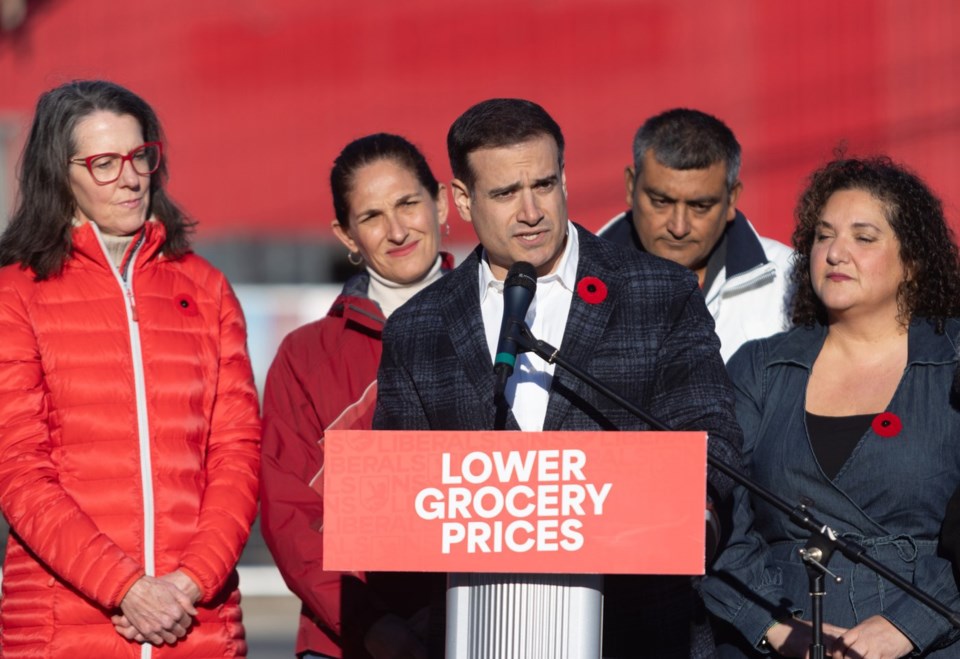HALIFAX — Nova Scotia's growing population was the subject of debate on Day 12 of the provincial election campaign, with Liberal Leader Zach Churchill arguing immigration levels must be reduced until the province can provide enough housing and health-care services.
Churchill said Thursday a plan by the incumbent Progressive Conservatives to double the province's population to two million people by the year 2060 is unrealistic and unsustainable.
"That's a big leap and it's making life harder for people who live here, (including ) young people looking for a place to live and seniors looking to downsize," he told a news conference at his campaign headquarters in Halifax.
Anticipating that his call for less immigration might provoke protests from the immigrant community, Churchill was careful to note that he is among the third generation of a family that moved to Nova Scotia from Lebanon.
"I know the value of immigration, the importance of it to our province. We have been built on the backs of an immigrant population. But we just need to do it in a responsible way."
The Liberal leader said Tim Houston's Tories, who are seeking a second term in office, have made a mistake by exceeding immigration targets set by the province's Department of Labour and Immigration. Churchill said a Liberal government would abide by the department's targets.
In the most recent fiscal year, the government welcomed almost 12,000 immigrants through its nominee program, exceeding the department's limit by more than 4,000, he said. The numbers aren't huge, but the increase won't help ease the province's shortages in housing and doctors, and the increased strain on its infrastructure, including roads, schools and cellphone networks, Churchill said.
"(The Immigration Department) has done the hard work on this," he said. "They know where the labour gaps are, and they know what growth is sustainable."
In response, Houston said his commitment to double the population was a "stretch goal." And he said the province had long struggled with a declining population before that trend was recently reversed.
“The only immigration that can come into this province at this time is if they are a skilled trade worker or a health-care worker,” Houston said. “The population has grown by two per cent a year, actually quite similar growth to what we experienced under the Liberal government before us."
Still, Houston said he's heard Nova Scotians' concerns about population growth, and he then pivoted to criticize Prime Minister Justin Trudeau for trying to send 6,000 asylum seekers to Nova Scotia, an assertion the federal government has denied.
Churchill said Houston's claim about asylum seekers was shameful.
"It's smoke and mirrors," the Liberal leader said. "He is overshooting his own department's numbers for sustainable population growth and yet he is trying to blame this on asylum seekers … who aren't even here."
In September, federal Immigration Minister Marc Miller said there is no plan to send any asylum seekers to the province without compensation or the consent of the premier. He said the 6,000 number was an "aspirational" figure based on models that reflect each province’s population.
In Halifax, NDP Leader Claudia Chender said it's clear Nova Scotia needs more doctors, nurses and skilled trades people.
"Immigration has been and always will be a part of the Nova Scotia story, but we need to build as we grow," Chender said. "This is why we have been pushing the Houston government to build more affordable housing."
Chender was in a Halifax cafe on Thursday when she promised her party would remove the province’s portion of the harmonized sales tax from all grocery, cellphone and internet bills if elected to govern on Nov. 26. The tax would also be removed from the sale and installation of heat pumps.
“Our focus is on helping people to afford their lives,” Chender told reporters. “We know there are certain things that you can’t live without: food, internet and a phone …. So we know this will have the single biggest impact.”
The party estimates the measure would save the average Nova Scotia family about $1,300 a year.
“That’s a lot more than a one or two per cent HST cut," Chender said, referring to the Progressive Conservative pledge to reduce the tax by one percentage point and the Liberal promise to trim it by two percentage points.
Elsewhere on the campaign trail, Houston announced that a Progressive Conservative government would make parking free at all Nova Scotia hospitals and health-care centres. The promise was also made by the Liberals in their election platform released Monday.
"Free parking may not seem like a big deal to some, but … the parking, especially for people working at the facilities, can add up to hundreds of dollars," the premier told a news conference at his campaign headquarters in Halifax.
This report by The Canadian Press was first published Nov. 7, 2024.
— With files from Keith Doucette in Halifax
Michael MacDonald, The Canadian Press



